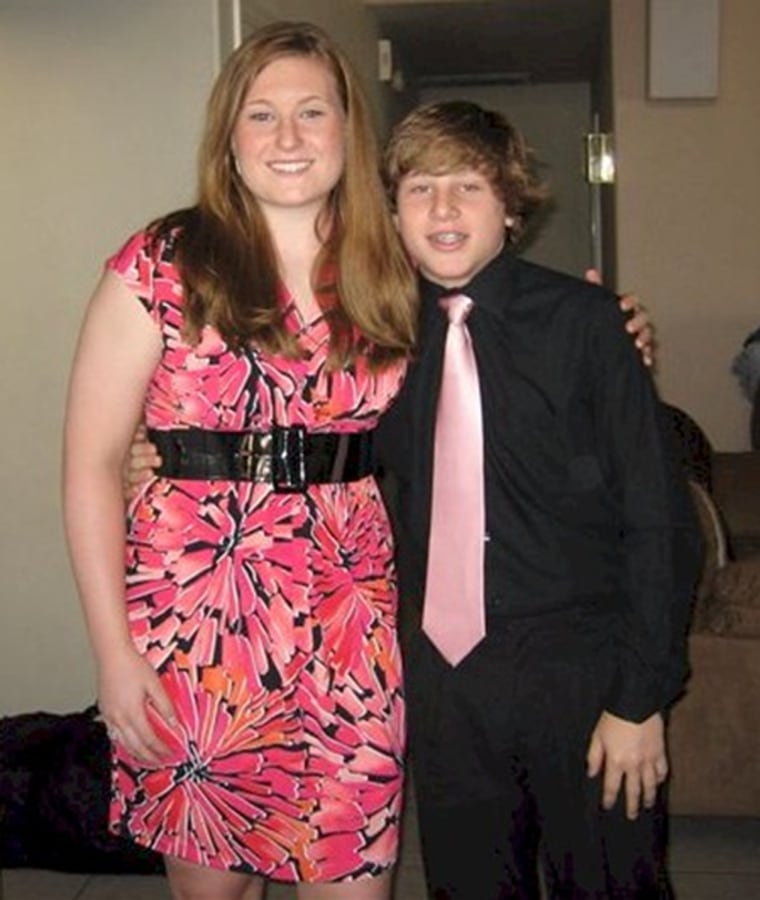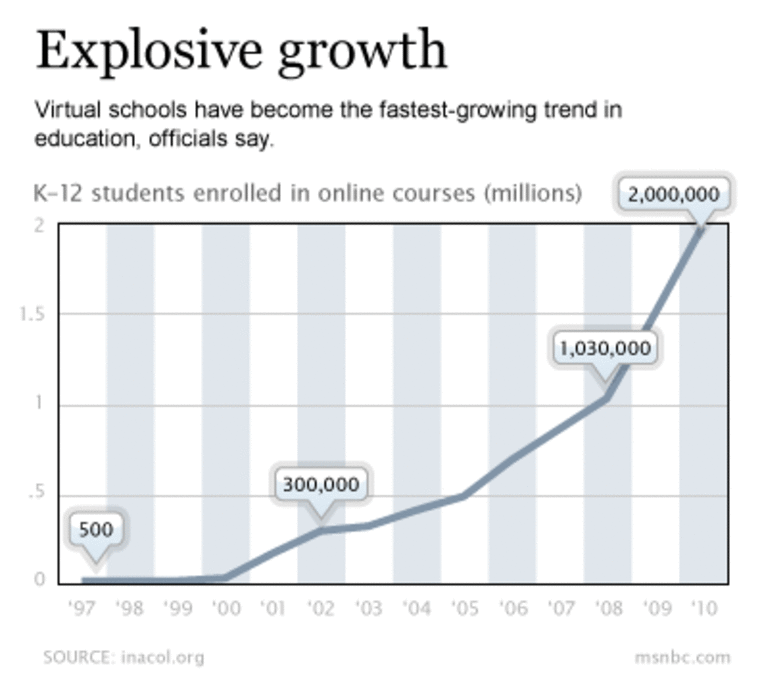Lyndsey Fry has a message about kids who attend school online: "We're not slackers."
The 17-year-old hockey phenom from Arizona moved from online high school diploma to Harvard. Now her younger brother Wesley seeks a similar goal — to graduate from the same virtual high school.

"It will be a whole new experience," said Wesley, 15, who forayed into virtual learning this fall. "I'll miss my friends, my school. But I won't miss getting up early, especially to catch the 6:30 a.m. bus."
Kidding aside, the Frys' choice of online schooling is serious stuff: The fastest-growing trend in education has more than 2 million students enrolled nationwide, said Susan Patrick, president of the International Association of K-12 Online Learning, an advocacy group in Vienna, Va. In the U.S., 32 states provide virtual learning, with 25 states offering a full-time online education, she said.
"Some people think that online learning is just a piece of software, but it's much more than that," said Patrick. "What we're trying to do is to make the online option available to every student. And students are interested."
Reasons behind the growth spurt:
- Online education, or remote learning, offers greater flexibility for students with extracurricular demands, like elite athletes, child actors, children with disabilities or illnesses.
- Virtual school also helps young people who want more independence with their classes, or want to spend more time with their families.
- Remote learning provides another option for parents who want to home-school but don't have the expertise or time to do so.
- Traditional schools are starting to offer online courses and using their own teachers to complement curriculum.
But online education may not click with every child's need, advocates, teachers and critics caution.
"Students shouldn't be forced, but rather be made aware of another option available to them," said John Watson, co-author of "Keeping Pace With K-12 Online Learning."
'Definitely a trade-off'Many critics fear the lack of face-to-face interaction fosters isolation, stunting a student's socialization skills. There's also concern over adequate oversight and the quality of education.
"There's definitely a trade-off," said Shenelle Cooper, a Pennsylvania mother of six.
Her daughter, Saadia, graduated this year from Commonwealth Connections Academy, an online public high school in Delaware County. Her son, Jewlyin, just started 10th grade and has been a virtual school student since seventh grade.

"The curriculum is hard," Cooper said. "It's a different way of learning. People think it's going to be easy and that you can do whatever you want. But that's not the case. You have to be on top of things."
Discuss: Has your child switched from home-school to a traditional school?
Teachers are no exception; just ask Kim Thomson, a physical education teacher from Canton, Ohio.
"If used for the right reason, online schools can be very effective. But it definitely has its moments," said Thomson, a 30-year teaching veteran. She teaches traditional and online physical education classes in Ohio. "For instance, I had a kid in my online gym class who turned in a 4-minute, 10-second mile. I e-mailed him right away, told him to drop out of school and try out for the Olympics. He was going to be our next running champion."
It turned out he had cheated and logged in a faulty form, she said. Thomson told the student to go back and run another mile, and be honest with the results. The student accomplished the task, but Thomson said sometimes you never know.
It's up to the teacher to be on top of the class, said Chris Dede, a professor of learning technologies at the Harvard Graduate School of Education. "Online is better for some students than face-to-face, while face-to-face is better for others than online."
Dede said while an online alternative for high schoolers is fine, he remained skeptical about providing a virtual classroom for many youngsters. To develop in a healthy way, sometimes the child will simply have to do it for himself, he said. For example, Dede said he wouldn't want younger children to learn how to crawl over and under obstacles by using an avatar, but by bending and rising by themselves in a playground.
‘A perfect fit’
Lyndsey Fry was in her junior year at Tempe Corona del Sol High School when she was picked to play for Team USA's national hockey team.
To compete in championships, Lyndsey had to miss school days and there were too many for her school to approve, her mother, Lynne Fry, said.
After a friend mentioned virtual schools, Lynne Fry said she checked out several programs before deciding on Arizona Connections Academy, linked to the nationwide Connections Academy, which has 20,000 students in K-12.
"They can literally do school any place they can get an Internet connection," Connections Academy President Barbara Dreyer said.
Many online schools also provide necessary gear — from computers, laptops, headsets, computer ink, printers, whiteboards to Internet subsidies. Books and worksheets are also delivered to the student's doorstep.
The Connections Academy also is in compliance with NCAA standards for student-athletes, Dreyer said.
So who pays for all of this? It all depends, Patrick said.
"Funding varies from public funding to tuition depending on state and local policy," Patrick said. "In the vast majority of online learning, it shouldn't cost the families anything if it is a public school."
However, a few districts do charge tuition for online courses, she said.
‘Definitely worth it’Lyndsey had no trouble finding a balance between her athletic pursuits and academic goals. She attended every discussion and turned in every assignment, thanks to her laptop computer.
"I loved my online school experience," Lyndsey said. "You do sacrifice some, but you get so much out of it. It's definitely worth it."
She said she had to get used to the idea of not seeing her friends at school and not being able to attend many social functions, clubs or activities. She didn't attend a senior prom.
Today, Lyndsey, who graduated in May with a 4.3 grade point average, is attending Harvard, where she plans to pursue a degree in mechanical engineering. She also will play forward for Harvard's Crimson. Her dream is to play forward for the U.S. team in the 2014 Winter Olympics in Sochi, Russia.
And her brother Wesley? He's ready to tackle his sophomore year.
"I think it's going to be a great experience and I am looking forward to getting better attention and a lot more one-on-one time," he said.
Their mother, Lynne Fry, said while her children share the same grit and grace on ice, they tackle academics quite differently. Lyndsey is organized, disciplined and a self-starter; Wesley is shy and quiet. While Lyndsey is quick to ask questions, Wesley is not.
“Wes is going into online learning for a different reason than Lyndsey, but the benefits and flexibility will be the same,” mother Fry said.
‘Sink or swim’Many parents, like the Coopers of Pennsylvania's Delaware County, said they opted for this route to help suit their children's strengths — and weaknesses.
"We felt that the elementary schools were fine for our younger children, but we needed alternatives for our older children," Shenelle Cooper said. "We wanted to prep our oldest daughter for college and wanted her to understand the meaning of time management. And our son, well, he needed to learn that there was a time and place for everything. He didn't need to socialize as much."
Her daughter, Saadia Feliciano-Cooper, 18, graduated with honors this past June. She is now attending Widener University with plans to double major in sociology and criminal justice.
"The first year was difficult, because it was a very different learning experience," Saadia said. "It was either sink or swim. The following year, I adapted, and by my senior year, I was going to have fun no matter what. And I did."
Vidya Rao contributed to this report.